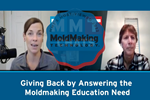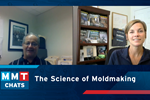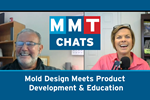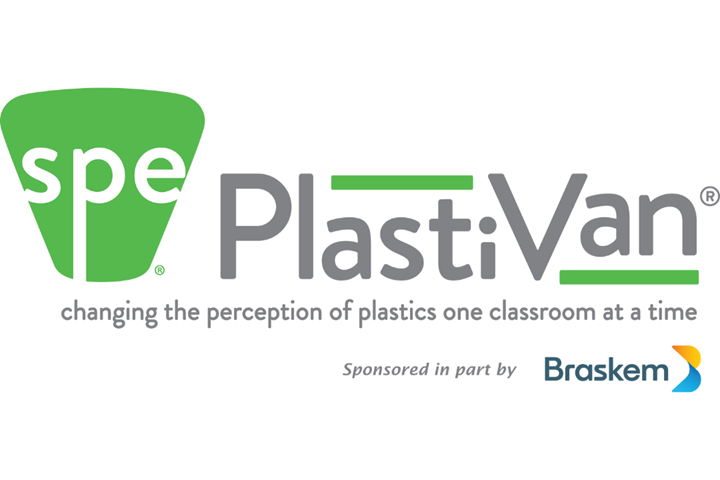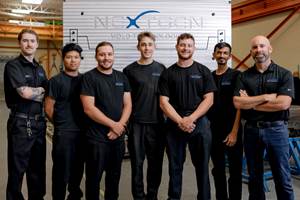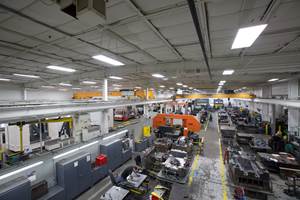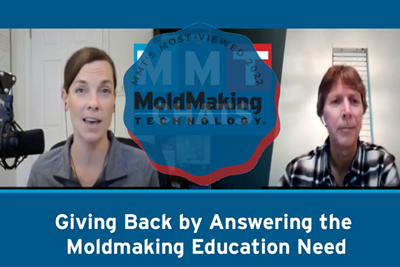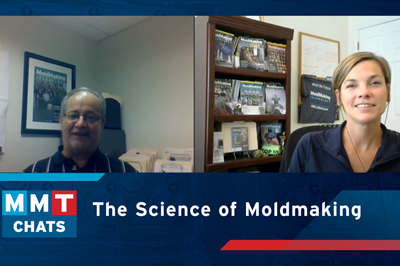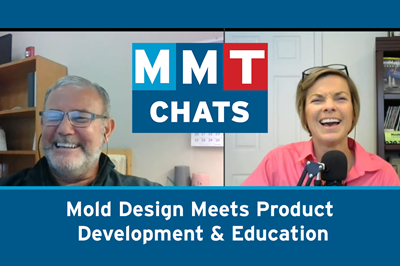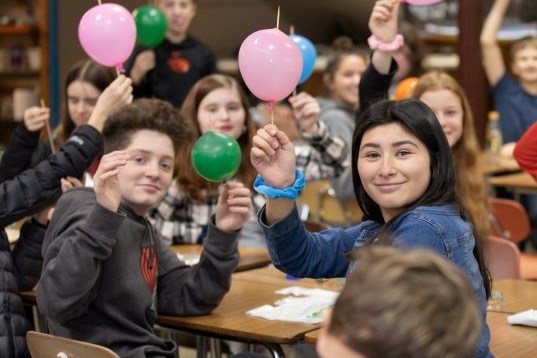
The PlastiVan Program engages students and excites teachers about new ways to integrate plastics into their education plans. Photo Credit, all images: SPE Foundation, PlastiVan
Take us through your journey to working with PlastiVan?
Eve Vitale, Chief Executive with the SPE Foundation of the Society of Plastic Engineers: I did not have a plastics background until the last 10 years. I am a mechanical engineer and as I was getting my Masters in manufacturing during the big crash of 2009, I got involved with plastics at the university where I was studying. I also was employed at the university at the time, working in corporate and foundation development for STEM programs. My husband at the time was faculty at this university and he got a plastics program going, and I was excited to learn more about plastics and got involved with the SPE [Society of Plastics Engineers]. We were able to get the students engaged in plastics because they just wanted hands-on experiences in the lab and that’s where the faculty at the university excelled.
Over time, my husband and I realized we were super interested in sustainability. So we started working on projects helping companies use their post-industrial waste for better and higher purposes.
We left the university and started our consulting firm in plastic sustainability. At the time, Russ Broome from SPE reached out and asked me to help him with the SPE Foundation and PlastiVan and I first said, “Absolutely not.” But after about 36 hours, I changed my mind.
I’d always been involved in education. Since the fourth grade, I had been tutoring other students and the thought of being able to go out and get people excited about what we’re doing in the plastics industry, and all of the careers that were available, was tempting. So, I took on the SPE Foundation.
What is the origin of PlastiVan?
Vitale: The PlastiVan Program has a 25-year history. It started in the Plastics Museum and then went to what was formerly known as SPI. Then it was brought in-house to SPE, which I believe is the best place for it because we’re all about education here. The mission is to change the perception of plastics one classroom at a time.
Who is SPE Foundation/PlastiVan targeting?
Vitale: We are working with schools that have under-resourced and underrepresented students because we believe this is an untapped market to fill the skills gap. Schools in Detroit are hungry for this education for their students. We had a big STEM event and 300 kids came through. One of the teachers thanked me for the opportunity and started crying, saying their students don’t get this opportunity and want it.
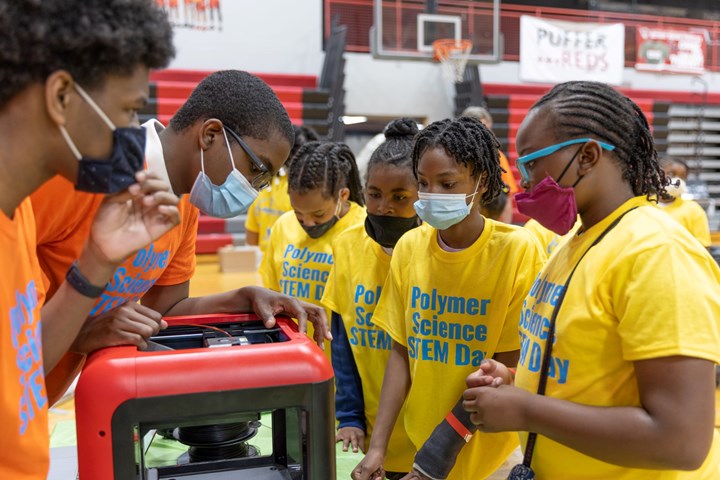
PlastiVan is available throughout the U.S. to educate students, teachers and the general public about the chemistry, history, processing, applications and environmental issues of plastics.
Describe PlastiVan in a nutshell.
Vitale: The PlastiVan Program is designed to excite students about opportunities in science and engineering within the plastics industry through lively demonstrations and hands-on activities. Students are educated about the chemistry, history, processing, manufacturing and sustainability of plastics and how the science and real-world applications relate to their everyday lives.
The program provides sound science and educational programs which spark scientific curiosity in students while increasing their knowledge of the contribution plastics make to modern life, encouraging them to seek careers in engineering. The program is aligned with Next Generation Science Standards (NGSS), which are K–12 science content standards.
The educational team includes professionals in packaging engineering, polymer science and engineering, recycling, materials science, environmental science, agricultural engineering, environmental sustainability, materials engineering and mechanical engineering.
We’re trying to make science and engineering cool. This is their extracurricular activity. This is their sport. They get into the lab and pick a project that interests them. They learn the scientific method and build their skill set.
What is the specific curriculum?
Vitale: The program is easily integrated into school curricula. A PlastiVan visit typically consists of five classes/day for up to 40 students/class or is individually designed for STEM and science fairs.
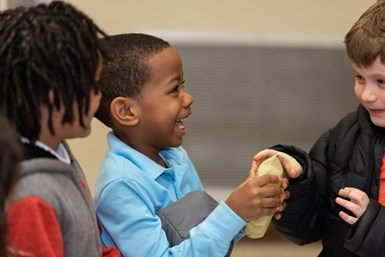
PlastiVan targets nine-year-olds through high school students whose “sport” is science.
Kids are being inundated with the notion that plastics are harmful and that we need to get rid of plastics, so the first thing we do in every classroom is explain how plastics impact their lives. We do that through their cell phone. We tell them that if we need to get rid of all plastics, then they need to put their cell phones in the trash can, too.
This sounds cliché, but for kids who have not thought about it, it opens their eyes and they realize they need to understand more about plastics.
We talk about reduce, reuse, recycle and upcycle. We take the student through the history of plastics. We share incredible stories, for example, how nylon was used in World War II and now in airbags. We take them through synthetic plastics and all the new plastics. We teach the difference between thermoplastics and thermosets. We talk about processes and even the future of plastics. It’s very hands-on.
Describe the “lab” program.
Vitale: One of the programs we’re working on now in a couple of markets — Detroit, Florida and Texas — encourages students to do their research in a lab from nine years old through high school. We’re trying to make science and engineering cool. This is their extracurricular activity. This is their sport. They get into the lab and pick a project that interests them. They learn the scientific method and build their skill set. It’s complementary to what they’re learning in school, and their test scores are much better than the average in the local school systems because they are getting hands-on experience. We are giving them a proper understanding of science and engineering. For example, many students are involved with 3D printing, an excellent pathway to moldmaking.
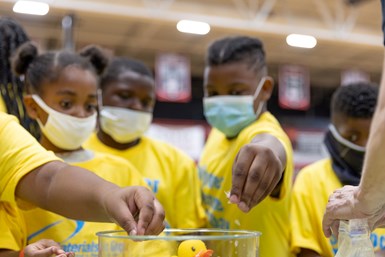
The PlastiVan Program provides sound science activities to spark curiosity in students while increasing their knowledge of the contribution that plastics make to modern life.
When COVID-19 hit, we could no longer be in the classroom, and we were scheduled to deliver classroom education to 40,000 students in 2020. So, we quickly transitioned and developed PlastiVideos (virtual visits/labs) with a community partner called Ecotek Science Lab. Ecotek is housed on Wayne State University’s Campus, and for 15 years they have been bringing students in to research whatever interests them. So, they are a perfect partner for these video resources.
Plus, we’re doing weekly afterschool SPE STEM Clubs for students. We started with five in Detroit and Florida, and now we have 25! The administrations and teachers are excited about bringing these opportunities to their students. We’ve rarely been this welcomed into school systems with plastics education. They are even talking about keeping it within their K-12 curriculum. So, we made a 10-year commitment.
We are also working with a school in Detroit trying to get students on the trades track, so the SPE Automotive Division has partnered with them through the SPE Foundation. They will be mentoring on site for several years.
We are working with schools that have under-resourced and underrepresented students because we believe this is an untapped market to fill the skills gap.
Share a student success story.
Vitale: One 11th-grade student doing research in the lab used 3D printing to create an adapter to charge electric vehicles. This is possible through our corporate partnerships like Arkema, which offers research grants ($500) to students as young as eighth grade. This all helps get kids comfortable with technology early, improving the chances of gravitating towards careers in manufacturing, even moldmaking.
Another example is a young man who had no clue about plastics or manufacturing. He was involved in an SPE STEM Club at John Glenn in Bay City, Michigan, and is now in the Plastics Engineering Technology program at Ferris State University.
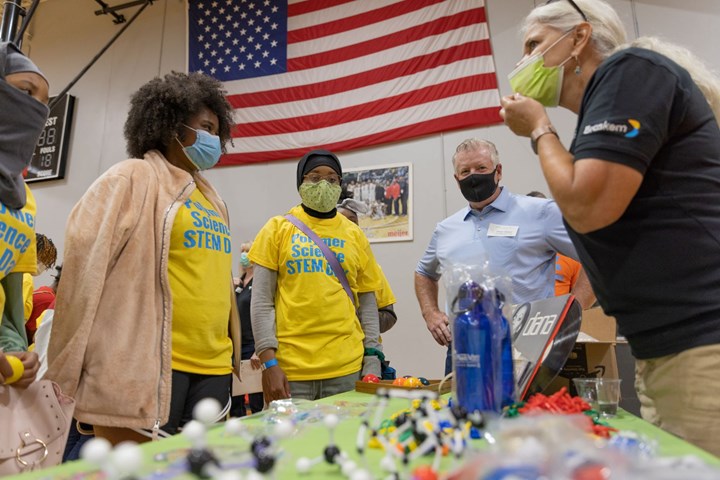
Organizations are encouraged to introduce their community to the benefits of plastics by sponsoring a visit from the PlastiVan. Companies that sponsor PlastiVan nurture the development of their future workforce by opening the minds of students to careers in science, engineering, technology and mathematics.
What is your top challenge?
Vitale: Our biggest challenge is getting corporations on board. They need people, which we are trying to help them with, so we need people who are willing to talk to students, spend time training students and provide financial support for our programs. We need partners who are ready to make a difference.
How can the moldmaking industry participate?
Vitale: We are asking our partners to sponsor one of these afterschool SPE STEM Clubs because we hire STEM coaches who will present (on site, via video) to mentor, help facilitate field trips to shops, et cetera.
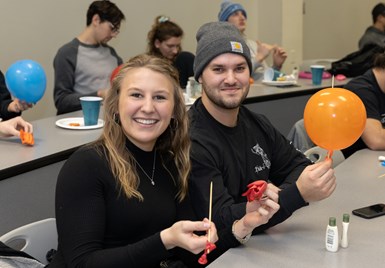
The PlastiVan Program is easily integrated into school curricula and is aligned with Next Generation Science Standards.
I have to recognize the teachers. We have relationships with schools that go back decades because the teachers recognize the value of what we’re offering to their students. Our biggest advocates are teachers like Sandy Schafer at John Glenn in Bay City, Michigan.
Any final words?
Vitale: Find a community partner and then put some resources into being there for these students so that they can understand what you’re doing, get excited about it and then make them part of your community. We must change our attitudes about young people.
Related Content
NextGen Mold Technologies is Sticking to the Plan
I caught up with Dennis Goggin, president of NextGen Mold Technologies, to learn how much has changed for this startup mold builder since we last connected.
Read MorePartnerships Fuel Moldmaker’s Growth in Technology and Training
Family-owned precision moldmaker, now backed by Heico Companies, combines financial strength with precision expertise in thermoset and thermoplastic manufacturing, apprentice training, advanced automation and comprehensive services.
Read MoreGrowth Requires Mold Builder/Molder to Shift Tooling Focus to Maintenance, Repair and Replacement
The results of aligning awareness and acceptance across departments to balance new tooling and quick response needs.
Read MoreDesign Strategy Tackles Big and Small Complexity Challenges for Southeastern Mold Builder
Delta Mold Inc.’s core values, engineering expertise, five-axis machines and molding capabilities help the team turn a proposal into a manufactured mold or part with custom design, finishing and assembly.
Read MoreRead Next
MMT Chats: Giving Back by Answering the Moldmaking Education Need
MoldMaking Technology Editorial Director Christina Fuges checks in with Bruce Cateon, an executive advisor at OASIC Consulting. Bruce started out in moldmaking, eventually becoming an industry consultant and taking time to work on his passion project the “Injection Mold Design Handbook” as a way of giving back to the industry that has given him so much. This episode is brought to you by ISCAR with New Ideas for Machining Intelligently.
Read MoreMMT Chats: The Science of Moldmaking, Part 1
MoldMaking Technology Editorial Director Christina Fuges chats with Don Smith, North American Senior Tooling Engineer for Scholle IPN in Northlake, Illinois about the future and science of moldmaking.
Read MoreICYMI, MMT Chats: Mold Design Meets Product Development & Education
For this MMT Chat, my guest is Rick Seaberg, an engineering manager for Medline Industries of Northfield, Illinois. He is also one of MMT’s newer Editorial Advisory Board members. Rick and I take a trip down memory lane and then look forward to today’s trends and challenges in mold design and engineering. This episode is brought to you by ISCAR with New Ideas for Machining Intelligently.
Read More


